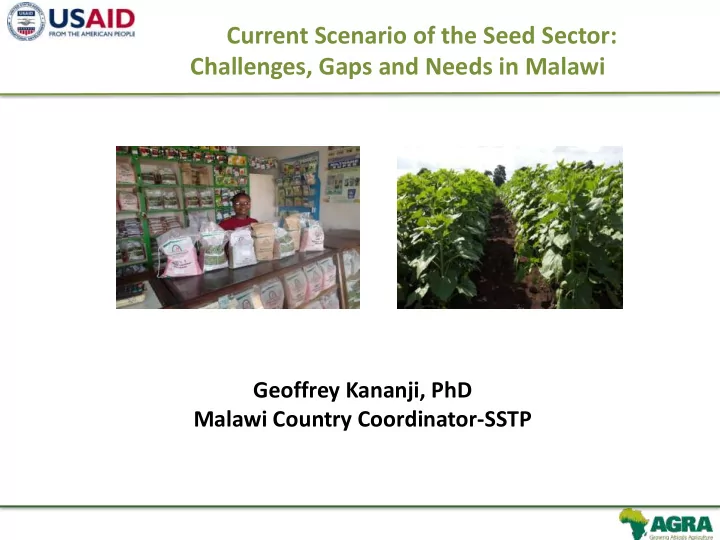

Current Scenario of the Seed Sector: Challenges, Gaps and Needs in Malawi Geoffrey Kananji, PhD Malawi Country Coordinator-SSTP �
Introduction • Of all the inputs used in agriculture, none has the ability to affect productivity as much as seed. • Seed places the upper limit on yield potential and influences the productivity of other inputs by determining the ability of plants to convert radiation, water, carbon dioxide and other nutrients into biomass �
Introduction cont.… • Seed, unlike fertilizer, is a living entity consequently handling, processing, transportation, exposure to heat, moisture and storage have to be carefully considered otherwise seed quality will be affected • It must be realized that Malawi is an agricultural based country • Agriculture has been the “leading” sector that has accelerated growth in countries such as China, India • However, when the main productive sector in the economy is agriculture, rapid growth will not occur unless agricultural productivity increases �
Importance of high quality seed • Availability of high quality seed is crucial to achieving food security and social and economic growth in Malawi. • The benefits from distribution and use of good quality seed are enormous: Increased and sustained crop productivity Increased household incomes Reduced risks from pest and disease pressure Production patterns would become more predictable and sustainable. �
The Malawi Seed Sector • Characterized by the presence of national & multi-national seed companies making the formal sector • Supported by an enabling environment • The Malawi seed sector is also characterised by strong promotion of hybrid maize seed • Informal seed sector also exists (farm saved, CBSS, NGOs) �
Needs, Gaps and Challenges • Access to quality seed of improved varieties remain a problem for many smallholder farmers • There is need to improve efficiency and service delivery of the seed certifying body (Seed Services Unit) through technical and policy support • The seed companies have expanded from only two in late 1970’s to over 20 seed companies currently. The Seed Services Unit needs structural transformations to meet this change to enable it deliver quality services. �
Needs, Gaps & Challenges cont.. • It is about time to make the Seed Certification and Quality Control unit a semi-autonomous body (detach the services of the unit from government to make it independent and hence more efficient). Examples: SANSOR in South Africa; SCCI in Zambia; TOSCA in Tanzania �
Needs, Gaps & Challenges cont.. • Address information gap on demand and availability of certified seed (this has created problems for all players). STAM encouraged to set up an office with a full time employee to coordinate and link breeders to seed companies and/ or seed producers on projected/effective seed demand/requirement. This will ensure that breeders plan ahead of time their production plan and this arrangement should ensure that good quality foundation seed is always available when needed. This office will improve information flow about new varieties developed by breeders to the seed companies for commercialization. �
Needs, Gaps & Challenges: cont.. • Capacity building of upcoming/potential seed companies by Seed Services The surge of so many players into the seed industry to produce and market seeds is a positive development because it will create competition thereby make certified seed affordable by many smallholder farmers in Malawi. However, quality should not be compromised, it will therefore be essential that the certifying body (SSU) and LUANAR through AIP provide targeted training to all seed companies, NGOs and farmers to ensure that all the standards are known and followed. It has been observed that there are discrepancies in skills and experience among seed producers resulting in poor post- harvest handling of seeds. �
Needs, Gaps & Challenges cont.. • All those involved in the whole value chain of seed production, processing, transportation and trade must be made responsible for their acts. Any misadventure or intended malpractices or undue profiteering motives be severely punished to keep seed industry clean. • The SSU should be capacitated to enable them monitor all seed certification and Quality control processes at each level �
Needs, Gaps &n Challenges cont.. • The subsidy programme in Malawi has distorted the seed market: demand for seed has increased making seed business lucrative and this has promoted cheating • Many people have no understanding of the distinction between seed and grain (Lilongwe central market is now selling beans at MK800/kg? • The Seed Services Unit has no control over who produces seed and what class of seed • Registered seed growers to undergo mandatory training ( ICRISAT organises training for all their seed growers) �
Needs, Gaps and Challenges cont.. • Research Stations where breeder seed is produced have no proper processing and storage facilities. This is 21 st Century and field operations and seed processing activities are still manually accomplished • Malawi is an agricultural country and we need to invest in agricultural research & development [ NDC to seriously look into this ] �
Needs, Gaps and Challenges cont.. • To increase agricultural production and productivity in Malawi, there is need to Strengthen the public-private sector partnership for Seed Certification and Quality Control • No longer business as usual, we need to move forward to join the New Alliance for Food Security and Nutrition: a shared commitment to lift millions of Malawians out of poverty �
THANK YOU �
Recommend
More recommend